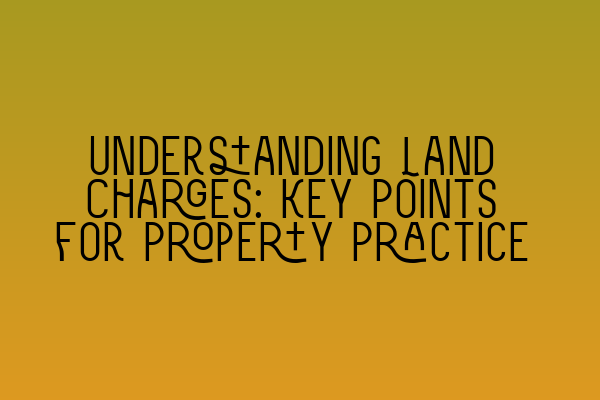Understanding Land Charges: Key Points for Property Practice
As property solicitors, it is crucial to have a strong understanding of land charges and their impact on property transactions. Land charges refer to charges or restrictions placed on a property or land that may affect its title and use. These charges are registered with the Land Charges Registry and are an important consideration when dealing with property matters. In this article, we will explore some key points about land charges that every property practitioner should be familiar with.
1. Types of Land Charges
Land charges can be broadly categorized into two types: statutory land charges and local land charges.
Statutory Land Charges: Statutory land charges include charges such as bankruptcy, insolvency, and council tax charges. These charges are registered with the Land Charges Registry and take priority over other charges that are not registered.
Local Land Charges: Local land charges are specific to the local area where the property is located. They include charges such as planning permissions, tree preservation orders, and conservation area designations. These charges are registered with the local authority and can affect the property’s use and development.
2. Searching the Land Charges Registry
Before proceeding with a property transaction, it is essential to conduct a thorough search of the Land Charges Registry. This search will reveal any registered land charges that may impact the property. It is crucial to review these charges carefully and assess their implications for the transaction.
Practice Tip: To get hands-on experience and test your knowledge of land charges, you can check out the SQE 1 Practice Exam Questions and SQE 1 Practice Mocks FLK1 FLK2.
3. Priority of Land Charges
Land charges have a specific priority order, which determines their order of payment or discharge in case of a property sale or transfer.
Generally, registered land charges take priority over unregistered charges. This means that any registered charges must be paid or discharged before other charges can be addressed.
Practice Tip: To enhance your understanding of land charges and their impact on property transactions, you can consider enrolling in SQE 2 Preparation Courses or SQE 1 Preparation Courses that provide comprehensive training in property law.
4. Effect of Land Charges on Buyers and Lenders
Land charges can have significant implications for both property buyers and lenders. As a property practitioner, it is crucial to advise your clients on the potential risks associated with land charges and help them make informed decisions.
For buyers, it is important to assess the impact of any land charges on the property’s value, use, or ability to secure financing. It is common for lenders to refuse to provide mortgages on properties with certain types of land charges. Therefore, buyers need to understand the financial and legal implications of these charges.
Practice Tip: Stay updated with the latest SRA SQE Exam Dates to plan and schedule your preparation effectively. Check out the SRA SQE Exam Dates.
5. Registering and Discharging Land Charges
If you need to register or discharge a land charge, it is crucial to follow the correct procedure and ensure compliance with the Land Charges Registry requirements. Failing to register a land charge properly may result in its loss of priority or ineffectiveness in subsequent transactions.
Similarly, when discharging a land charge, it is necessary to follow the prescribed steps and notify the relevant parties to ensure the discharge is properly recorded. This is particularly important when it comes to mortgage charges, as the discharge needs to be registered with the Land Registry.
In conclusion, land charges are an essential consideration in property practice. Understanding the different types of land charges, conducting thorough searches, assessing their impact, and following the correct procedures for registration and discharge are key to ensuring smooth property transactions. As a property solicitor, keeping up with the latest developments in land charges and related areas of property law is essential for providing effective advice to clients.
